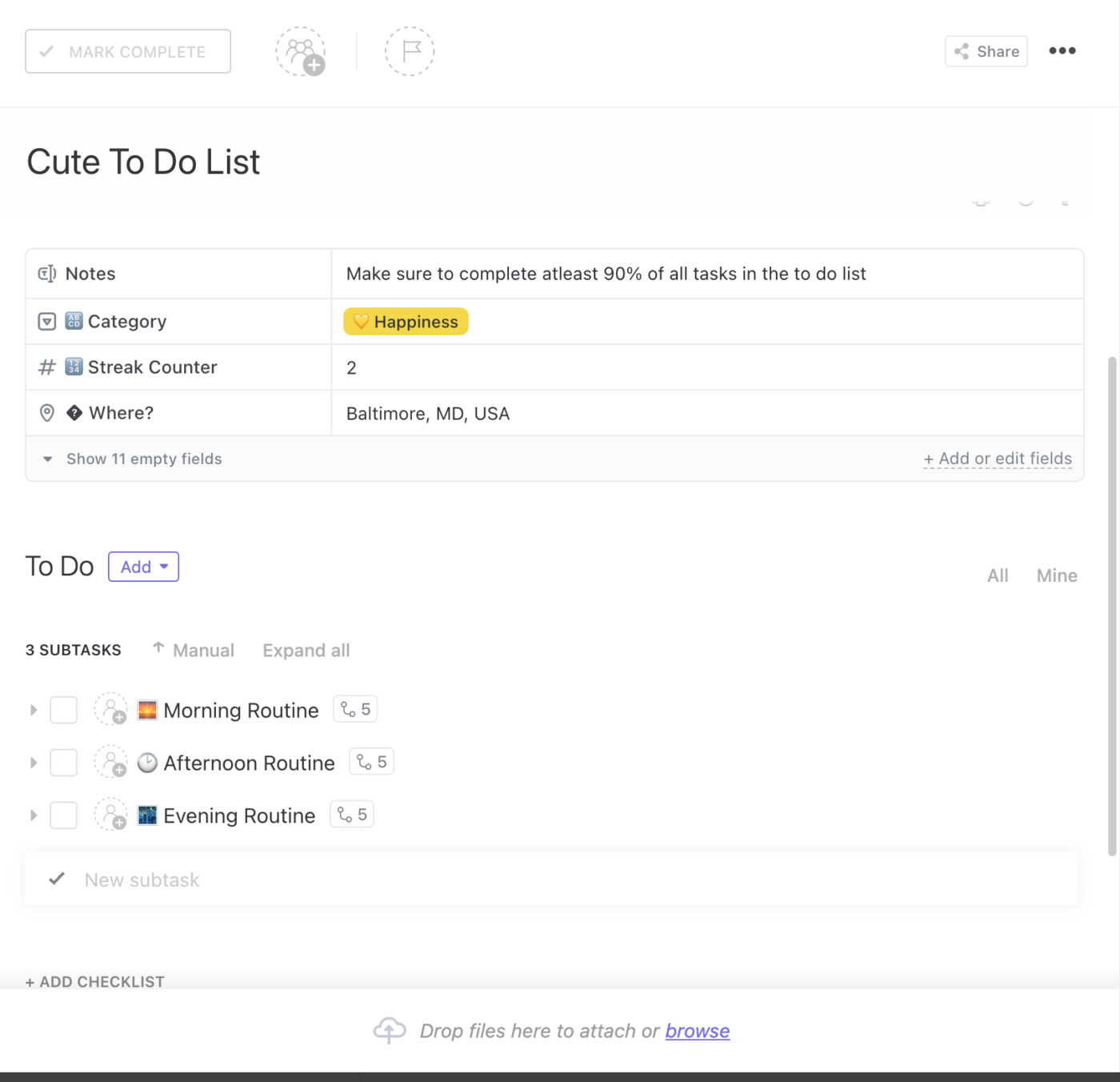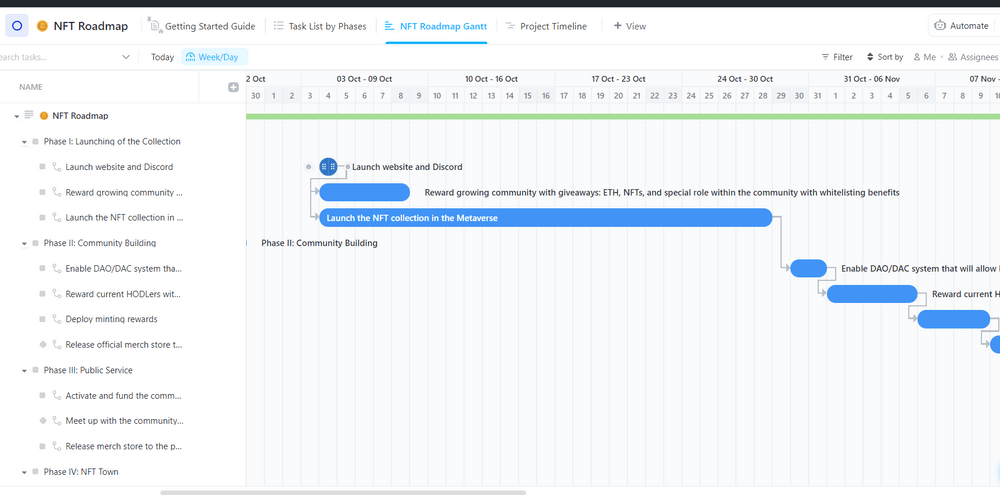

If you’ve ever worked with a sales manager, chances are you’ve heard them exclaim: We’ve just met our target! 🎯
Beyond meeting sales targets, sales managers are responsible for training, leading, and managing a team of sales professionals. They collaborate with other departments in the organization to ensure their sales strategy aligns with overall business objectives.
As we walk you through a day in the life of a sales manager, we’ll uncover insights into the various activities and responsibilities of these professionals. We’ll also shed light on:
- The common challenges sales managers face
- Valuable tips for managing their workload
- How to use ClickUp to streamline a sales manager’s daily tasks and projects
Who Is a Sales Manager?
Sales managers are the driving force behind the company’s sales team.🔋
Charged with creating, nurturing, and leading the company’s sales force, their primary purpose is to ensure the sales team’s success. This success is measured using sales key performance indicators (KPIs), such as the team’s ability to meet sales goals, their monthly sales growth, and customer acquisition cost.
To achieve their objectives, sales managers collaborate with upper management to develop and implement strategic plans for meeting targets while guiding and motivating the sales team. In other words, sales managers are the crucial link between the sales reps in the trenches and the higher-ups responsible for driving organizational growth.
These professionals ensure their team members have resources like sales plan templates to help them quickly identify their goals and the steps needed to get there.
Roles and Responsibilities of a Sales Manager
A sales manager’s role is dynamic, demanding a blend of critical thinking, leadership, and coaching skills to drive the company’s sales efforts.
In this section, we’ll break down the crucial roles and responsibilities a sales manager plays in any organization.
1. Leading the sales team
At the forefront of a sales manager’s many duties is the crucial task of leading the sales team. It usually encompasses activities such as:
- Onboarding new sales reps
- Training and developing the sales team
- Monitoring the progress of sales reps
Pro tip: The ClickUp Sales Process Template is an invaluable tool that helps sales managers lead a sales team to success. It maps out the steps each sales representative needs to take to nurture a lead from prospect to customer.
Sales managers can easily customize the template by specifying critical processes in the sales pipeline, like lead generation, negotiation, and closing. They can also indicate the particular activities involved in each of these processes.
The template can be reused to onboard new sales agents, giving them a clear overview of the sales pipeline and the tasks expected at each stage.
2. Strategic planning
Sales managers are responsible for devising strategies to propel their team toward meeting and exceeding the company’s sales target. They collaborate with various departments and leverage market insights to align sales objectives with organizational goals.
Sales managers must also be able to adjust their sales strategies to capitalize on emerging opportunities and mitigate potential threats, ensuring the company remains responsive to market changes.
3. Meeting sales targets
After collaborating with upper management to set achievable sales targets and devising strategies to meet these targets, sales managers create realistic sales goals for their teams.
They set these goals by examining market trends, conducting competitor analysis, factoring in budget constraints, and assessing product demand. They then segment overarching sales targets into smaller goals and tasks with clear deadlines.
Pro tip: Use ClickUp Goals to set objectives within the SMART framework for your sales teams with clear timelines and measurable targets. Monitor your team’s progress toward achieving the goals with automatic progress tracking.

4. Customer relationship management
Customer relationship management (CRM) is a paramount responsibility for sales managers, as it encompasses activities vital for acquiring, retaining, and growing the customer base. Effective CRM drives sales growth, ultimately leading to business expansion and increased revenue. 💸
Many sales managers work alongside their sales representatives to maintain client data records, including their names and positions in the pipeline, using powerful CRM tools. Together, they promptly address leads’ concerns and inquiries to sustain their interest and increase the chances of converting them into paying customers.
Pro tip: CRM platforms can be intimidating, especially for users with little or no experience using them. This is where CRM templates come in. You can easily customize these pre-built, beginner-friendly frameworks based on your business’s unique needs.
We highly recommend the ClickUp CRM Template for organizing customers’ account details and closed deals in a separate list. It makes it easy to keep track of customers’ journeys in the pipeline.

5. Conducting research into sales trends
By analyzing sales data and consumer behavior, sales managers can collaborate with a business development executive to proactively develop strategies for navigating potential threats and capitalizing on emerging market opportunities. Research into sales trends aids sales forecasting, a critical activity for anticipating future market demands.
Pro tip: Rely on the ClickUp Sales Forecast Template to visualize sales performance and monitor key metrics. With Custom Fields like product name, probability, and forecast amount, you can track progress toward sales targets and optimize strategies for enhanced business outcomes.

6. Analyzing and adjusting the sales pipeline
Sales managers frequently review and adjust the sales pipeline to ensure it aligns with market trends and evolving customer needs. This periodic evaluation allows them to identify areas for improvement so they can implement strategies to optimize the pipeline’s efficiency and effectiveness.
For instance, after reviewing the pipeline, a sales manager may discover the need to revamp advertising strategies or refine product messaging to better address customer needs.
A Comprehensive Look into a Day in the Life of a Sales Manager
While the specific duties of a sales manager can vary based on factors like the company size and industry, their daily routines often follow a consistent pattern. Let’s get to know it by examining a typical day in the life of a sales manager. 📅
Start of the day
For most sales managers, a typical day begins with a quick morning routine that sets the tone for the day ahead. The routine usually includes the following three activities:
- Outlining the tasks to be accomplished during the day
- Responding to emails from upper management and clients
- Reviewing the tasks allocated to sales representatives
Pro tip: When managing your daily tasks, you might find the ClickUp Daily To-Do List Template incredibly convenient. It allows you to streamline your workload by dividing tasks into morning, afternoon, and evening sections, each with specific objectives. As you complete each task, simply cross it off the list to get a feeling of accomplishment.

Meetings and task allocation
After responding to emails, sales managers engage in a series of meetings aimed at promoting cross-functional collaboration and driving employee engagement.
This part of the day usually begins with interactions involving upper management and cross-departmental engagements with the product and marketing teams. These meetings are intended to formulate operations strategies that cater to customer demands and keep sales managers updated on product and service modifications.
Afterward, the managers organize standup meetings with the sales team to discuss:
- The prior day’s activities
- Encountered obstacles
- Updates on individual assignments
A good sales manager drives both individual and collective success by addressing each challenge, offering solutions, and, when necessary, conducting one-on-one meetings with team members.
Once key concerns have been addressed and progress reports reviewed, the sales manager allocates tasks to sales team members based on their current workloads and competencies.
Afternoon session
After their daily rounds of meetings, sales managers handle tasks like:
- Interviewing sales applicants
- Developing training materials to onboard new agents
- Coaching new reps
- Researching sales trends
- Analyzing sales data
- Addressing customer complaints
- Preparing sales reports
These duties make up the bulk of sales managers’ workloads. Afterward, they head home to recharge and prepare for the challenges of the following day.
Common Challenges of Being a Sales Manager
Below, we’ll outline the everyday challenges sales managers face as they navigate the dynamic landscape of sales management.
1. Hiring talented sales reps
It’s often said that a leader is only as good as their team, and the same rings true for sales managers. Their knack for developing great strategies and meeting sales targets hinges on having a team of talented sales reps.
Yet, sourcing and hiring sales agents skilled in using sales tools, employing persuasive techniques, and building customer relationships is no walk in the park. A quality hire can boost a sales manager’s ability to hit their targets, while a poor one can spell financial setbacks for the entire company.
2. Coaching sales reps
Beyond hiring, sales managers must excel in coaching their sales reps to unlock their full potential. This involves onboarding new hires, providing ongoing support, and offering solutions to ensure each agent can meet their target. 🎯
In some instances, the manager’s job calls for joining the reps in the field to assess their performance, identify strengths, and provide targeted feedback for improvement. Overall, mastering the act of coaching is essential for nurturing talent, driving performance, and ultimately achieving sales success.
3. Pressure of meeting sales targets
Sales managers carry the weight of achieving sales targets on their shoulders. They’re constantly analyzing sales trends, adjusting strategies, and finetuning sales pipelines to meet these targets and ensure the company’s growth and profitability.
The pressure to meet and exceed targets is always on, especially since failing to do so could jeopardize the company’s position and future in a competitive market.
4. Retaining sales reps
With the competition for skilled sales reps heating up, keeping them onboard is crucial for a company’s long-term success. Sales managers must take adequate steps to prevent competitors from poaching top talent.
This involves fostering a supportive and inspiring work environment where sales reps feel empowered to excel even in challenging times. By building strong connections with their team members, sales managers can better understand their needs and preferences, ensuring they stay engaged and productive.
5. Time scarcity
Sales managers are always racing against the clock. Every available minute counts, whether it’s spent training sales reps and accompanying them on field trips, responding to customer inquiries, or strategizing to meet sales targets. ⏰
The challenge lies in allocating time effectively to ensure each task receives adequate attention while maintaining overall team productivity.
5 Tips for Surviving the Day as a Sales Manager
How do great sales managers overcome challenges and navigate their complex roles gracefully and efficiently? By deploying effective strategies and techniques that enable them to tackle any hurdle with confidence. Let’s explore five of these tried-and-tested best practices:
1. Plan ahead
Successful sales managers share a key trait—dedication to planning. They rely on calendars and productivity tools to meticulously schedule activities days and weeks in advance. 🗓️
This proactive approach enables them to schedule coaching sessions, allocate time for lead management, and prepare for upcoming sales initiatives. By staying ahead of the curve, they enhance their ability to meet sales targets and respond quickly to changes in market dynamics.
2. Prioritizing tasks
With many tasks vying for their attention, sales managers must master the art of time optimization to meet their objectives. Prioritization of tasks is critical to this process.
By pinpointing the most critical tasks, such as following up on important leads and prioritizing them over less urgent activities, sales managers can ensure they address pressing needs urgently.
This strategic approach allows them to allocate their time and resources effectively, focusing on high-impact activities that propel them toward their goals. 🥅
3. Break down large tasks into manageable bits
When faced with formidable sales targets and the responsibility of coaching a team of sales reps, it’s easy for sales managers to feel overwhelmed. Yet, rather than fixating on the big picture, successful sales managers understand the importance of breaking big-scale tasks into smaller, more manageable pieces.
By dividing daunting projects into bite-sized chunks, they can approach each segment with clarity and focus, steadily progressing toward their ultimate goal.
4. Be flexible
While planning provides a roadmap for success, sales managers must also embrace the fluid nature of the market.
With continuously evolving sales trends and customer needs, rigid plans can quickly become obsolete. Therefore, sales managers must be willing to adapt and adjust priorities to seize unexpected opportunities and navigate challenges effectively.
5. Take short breaks
Considering how fast-paced the sales world is, sales managers often feel overwhelmed by the demands of their roles. Yet, amidst the chaos, they need to prioritize self-care.
Taking short breaks, even for a few minutes, can provide much-needed relief from stress to recharge physically and mentally. This will enable them to tackle their tasks with renewed vigor. 📶
Tools and Techniques Used by Sales Managers for Daily Tasks and Projects
By combining battle-tested sales techniques with a capable sales enablement tool, managers can enhance the productivity and efficiency of their teams.
A prime example of such a tool is ClickUp, an all-in-one project management solution that helps large and small businesses streamline operations within a single platform.
What makes the platform especially valuable for sales teams is ClickUp Sales, an entire suite of tools and features for tracking leads, onboarding customers, and managing pipelines. The suite also includes various task management, collaboration, and automation tools to help sales teams and their managers streamline work and close deals faster.

track project progress and monitor team workload through ClickUp Tasks
Sales managers can also leverage ClickUp’s built-in CRM system, ClickUp CRM, to accelerate client growth and improve customer satisfaction.
The suite offers 15+ customizable views for managing and tracking your accounts and pipelines in various outlines like List, Board, and Table. It also comes with ClickUp Forms for collecting customer and sales data and custom Dashboards for visualizing and analyzing that data with various charts, graphs, and bars.

Let’s take a look at some impactful sales techniques that can enhance your daily operations, enabled by ClickUp’s diverse feature set:
1. Task prioritization and allocation
Task prioritization and allocation are critical for sales managers juggling numerous responsibilities. Good sales managers arrange tasks in order of importance and urgency and strategically assign them to their sales reps to maximize overall efficiency.
ClickUp Tasks lets you create a comprehensive list of assignments for your agents based on market trends, pipelines, and sales targets. Once you create tasks on the platform with accompanying details and deadlines, you can assign them to different team members.
These tasks can also be color-coded based on priorities so that each agent knows which assignment to start working on immediately. 💼

2. Task and project documentation
Project documentation is the backbone of successful sales management, ensuring vital information is accessible to all team members. 📃
ClickUp Docs is a prime example of a tool that can streamline data aggregation and organization. This document management platform allows users to collaboratively create, store, and manage sales reports, forecasts, research findings, and other documents vital for the success of your sales efforts.

3. Collaboration
Sales managers need to conduct daily brainstorming or strategic meetings with their sales teams, other departments, and upper management. ClickUp Mind Maps is a perfect tool for collaboration and idea generation during these sessions.

Sales managers can use Mind Maps to kickstart brainstorming sessions with their team, starting with a central idea depicted as a node. For example, if the central idea involves increasing sales in Q2 by 20%, the branches could depict key components like using pricing strategies and competitive positioning to improve sales performance.
Mind Maps also help illustrate the intricate relationship between elements like target market and sales channel selection. They provide insights into how the connection between such elements affects sales performance.
ClickUp Whiteboards is another powerful tool that supports real-time collaboration and ideation. It offers an infinite virtual canvas for visually representing ideas through various shapes or cards. You can move these objects around the Whiteboard and use connecting lines to illustrate their relationship.

4. Integration
Sales managers use various business tools like email platforms, communication apps, and CRM software to handle their daily work. However, working with multiple tools can often slow you down due to context switching, as well as lead to data silos.
This is where software integration comes in. It allows you to link data on different tools and access each tool’s functionality from a single platform.
ClickUp offers extensive integration capabilities that let you connect your favorite tools either directly or through third-party integration tools like Zapier. Manage client relationships with HubSpot, communicate via Slack, or organize sales team meetings on Zoom—without ever leaving ClickUp!
Drive Sales Success with ClickUp
While the role of a sales manager comes with numerous responsibilities and challenges, platforms like ClickUp make things smoother. With solutions for overseeing sales pipelines, managing customer relationships, setting goals, and a library of ready-made templates for onboarding and training sales reps, ClickUp equips sales managers for success.
Sign up for ClickUp today to empower your team, drive sales success, and take a step closer to achieving your sales targets. 🏹




